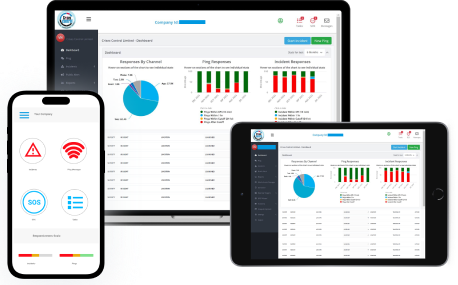In today’s dynamic business landscape, organisations face an ever-growing number of uncertainties. From financial fluctuations and operational disruptions to data breaches and reputational damage, these risks can significantly hinder an organisation’s ability to achieve its strategic objectives.
Picture this: You’re launching a revolutionary product, yet a nagging worry lingers. What if a critical supplier goes out of business? Or a cyberattack cripples your operations? These are just a few of the unforeseen events that can derail your business success. Risk management software isn’t just about predicting the future, it’s about empowering you to navigate uncertainty with confidence.
This blog dives deep into how this powerful technology can safeguard your organisation, explores the specific risks it tackles, and unveils how Crises Control can be your partner in building an unwavering foundation for success.
What is Risk Management Software?
Risk management software (RMS) is a powerful technological solution designed to streamline and facilitate the comprehensive risk management process. It serves as a centralised platform for identifying, assessing, prioritising, and mitigating potential threats to an organisation’s operations and assets.

Why is Risk Management Software Important for Business Continuity?
Business continuity refers to an organisation’s capability to maintain critical functions and processes in the face of disruptions. Proactive risk management is fundamental to ensuring business continuity.
Risk management software plays a vital role in business continuity by:
- Enhancing Risk Identification: RMS empowers organisations to systematically identify a wider range of risks, including internal threats, external factors, and emerging hazards. This comprehensive risk identification capability allows organisations to proactively address potential issues before they escalate into disruptive events.
- Streamlining Risk Assessment: Risk assessment involves evaluating the likelihood and potential impact of identified risks. RMS facilitates this process by providing standardised assessment tools and methodologies. These tools enable organisations to assign scores to each risk based on its severity and probability of occurrence.
- Prioritisation and Mitigation: Following the assessment stage, risks need to be prioritised based on the assigned scores. Risk management software assists in prioritising risks effectively, enabling organisations to focus their resources on addressing the most critical threats. Additionally, RMS offers functionalities to develop and implement mitigation strategies, such as risk avoidance, reduction, transference, or acceptance.
- Improved Decision-Making: Risk management software fosters data-driven decision-making by providing real-time insights into the risk landscape. Through comprehensive reporting and analytics, RMS equips stakeholders with the information they need to make informed decisions about risk mitigation strategies and resource allocation.
- Enhanced Compliance: Several industries have regulatory requirements for risk management practices. Risk management software can streamline compliance efforts by ensuring adherence to relevant standards and regulations.
With What Risks Can Risk Management Software Help?
Organisations can leverage risk management software to address a diverse range of risks, including:
- Financial Risks: Financial risks encompass potential losses due to market fluctuations, economic downturns, or fraudulent activities. RMS can assist in monitoring financial indicators, identifying potential financial threats, and implementing appropriate safeguards.
- Operational Risks: Operational risks stem from internal process inefficiencies, human errors, or technological disruptions. Risk management software can aid in streamlining operations, identifying potential disruptions, and implementing measures to ensure operational continuity.
- Strategic Risks: Strategic risks are associated with an organisation’s long-term goals and objectives. These can include risks arising from market changes, technological advancements, or competition. Risk management software can facilitate scenario planning, enabling organisations to assess the potential impact of various strategic decisions.
- Compliance Risks: Failure to comply with industry regulations or legal requirements can result in hefty fines, reputational damage, and operational disruptions. Risk management software can assist organisations in staying up-to-date with regulatory changes, tracking compliance requirements, and implementing necessary controls.
- Reputational Risks: Negative publicity or brand image damage can significantly impact an organisation’s customer base and market position. Risk management software can help organisations monitor brand sentiment, identify potential reputational threats, and implement crisis communication strategies.
How Can Crises Control Help?
Crises Control is an award-winning provider of risk management solutions, offering a comprehensive suite of services and technologies to empower organisations in building resilience against various threats. Our team of experts possesses extensive knowledge and experience in risk identification, assessment, mitigation, and preparedness.
We offer a robust risk management software solution that incorporates the following features:
- Centralised Control Hub: A comprehensive repository for recording, classifying, and tracking all identified risks.
- Risk Assessment Tools: Standardised tools and methodologies for evaluating the likelihood and impact of potential risks.
- Crisis War Gaming: To assess the potential ramifications of various strategic decisions and unforeseen events.
- Reporting and Analytics: Real-time insights and customisable reports to facilitate informed decision-making.
- Incident Management: Streamlined processes for managing and resolving incidents effectively.
- Business Continuity Planning: Tools and resources to develop and implement comprehensive business continuity plans.
Conclusion
In today’s dynamic business environment, unforeseen events and potential disruptions pose a constant threat to operational continuity and strategic objectives. Simply put, risk management software is no longer a luxury, it’s a necessity.
This comprehensive guide explored the various facets of risk management software, delving into its functionalities and how it empowers organisations to:
- Systematically identify a wider range of risks.
- Prioritise threats based on their potential impact and likelihood of occurrence.
- Develop and implement effective mitigation strategies.
- Gain real-time insights to facilitate informed decision-making.
- Ensure adherence to regulatory requirements.
By implementing a robust risk management software solution, organisations can cultivate a proactive approach to addressing potential issues, safeguarding their operations, and fostering a culture of resilience.
Ready to take control of your organisation’s risk landscape? Crises Control offers a powerful risk management software solution equipped with the functionalities outlined above. Request a free personalised demo today and connect with a risk management expert who can guide you through the process of getting started. We are committed to partnering with you in building a resilient and future-proof organisation.
Request a Free Demo
Interested in our Risk Management Software?
FAQs
1. What is Risk Management Software?
Risk Management Software (RMS) is a technological tool designed to streamline the process of identifying, assessing, prioritising, and mitigating potential threats to an organisation’s operations and assets. It acts as a central platform for managing all aspects of risk.
2. Why is Risk Management Software important for Business Continuity?
Business continuity refers to an organisation’s ability to maintain critical functions during disruptions. Proactive risk management is essential for ensuring this continuity. RMS helps by:
– Identifying a wider range of risks
– Facilitating risk assessment
– Prioritising risks and developing mitigation strategies
– Offering data-driven insights
– Enhancing compliance
3. What are some specific risks that Risk Management Software can help address?
– Financial Risks
– Operational Risks
– Strategic Risks
– Compliance Risks
– Reputational Risks
4. How can Crises Control help with Risk Management?
Crises Control is a provider of risk management solutions offering a comprehensive suite of services and technologies. Our expertise includes:
Risk Identification & Assessment: We possess extensive knowledge and experience in helping organisations identify and assess various risks.
Software Solutions: Crises Control offers a robust risk management software solution with features like a centralised control hub, risk assessment tools, scenario planning, reporting & analytics, incident management, and business continuity planning functionalities.








